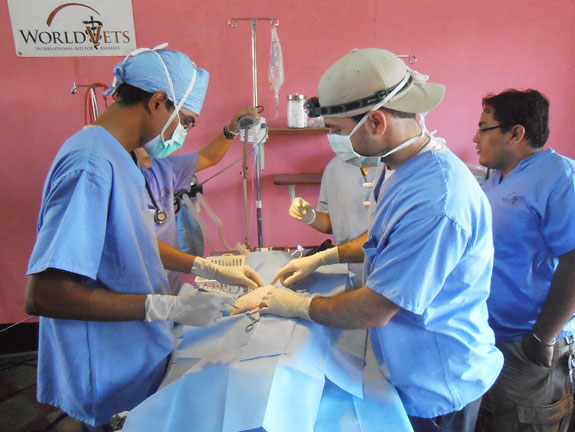Quivering all over, a dirty yellow and white puppy with a large potbelly whimpers as a veterinarian injects it with saline fluids. The puppy is severely dehydrated and disoriented, unable to stand up on its own.
Chancho, as the veterinarians name him because of his pig-like round belly, initially had a grave prognosis. Found wandering along the street, and visibly weak with parasites and tremors, he did not have long to live.
The puppy spends the night on intravenous fluids and medication. When the veterinarians return the next morning, his condition has improved. By the following day, they are confident he will survive.
Chancho was the second patient seen that day by World Vets volunteers at the Surgical Training Center, a veterinary clinic located in Granada, Nicaragua. A nonprofit organization headquartered in Fargo, North Dakota, World Vets provides veterinary aid and disaster relief in developing countries. It opened the clinic to house its new International Veterinary Medicine Program, which will train hundreds of veterinarians and veterinary students from across the globe.
Since 2006, the start-up nonprofit has grown into an international organization that has administered thousands of emergency surgeries conducted by volunteer veterinarians in developing countries. World Vets also responds to international crises, from rescuing stranded pets in flood-ravaged Thailand to scouring debris for animals that survived the 2011 earthquake in Japan.
“We started out with nothing—just the vision that veterinarians from all over the U.S. could help on projects,” says Dr. Cathy King ’97 DVM, who started World Vets with a donation jar at her clinic in Deer Park. “It just grew from there and three years later became a full-time job for me. Now we send out a team almost every week of the year.”
The work, funded by donations and grants, benefits a wide range of animals, such as elephants in Asia, horses in Central America, and military dogs in Iraq. World Vets runs on a $2 million annual budget, about half of which is in-kind product donations like veterinary medicine and equipment.
More than 3,500 people have volunteered for the organization in 36 countries. All volunteers pay their own travel expenses, so 100 percent of donations go toward running the programs, says King.
The Surgical Training Center, located in a small suburb of Granada, looks like a typical home save the red and black World Vets sign hanging above the front porch.
Nicaraguan veterinarians trained by World Vets run the center, which opened last November. For eight months of the year, the center provides training for Latin American students. During the remaining four months, the program offers hands-on immersion into international veterinary medicine for North American and European students.
“In all the time we’ve been out here doing this work, we’ve had a lot of local vet students interested in learning who weren’t getting a lot of surgical instruction in school,” says King. “We decided that in order to maximize our impact we would put a focus on training.”
The Surgical Training Center and International program, like World Vets field projects, are self-sufficient.
Students from the United States will pay to participate in the summer training sessions. The money from their tuition pays for the Latin American students during the year. Animals brought in for classes will also get neutered for free, continuing to help curb animal overpopulation in Nicaragua.
“That is the beautiful part about this program,” says Claudio Mayorga, general manager of the Surgical Training Center. “The Latin American students pay absolutely nothing to participate in the training sessions. They receive everything they will need, including a DVD of the surgeries they can watch at home. This training, if not part of a self-sufficient program, would be very expensive.”
Mayorga says the clinic and training sessions will develop better veterinarians in Nicaragua.
“Veterinarians in Nicaragua have all the knowledge to perform surgeries but don’t have the practice,” he says. “Not all of the universities in this country have a surgery room with all the equipment necessary. This clinic meets those necessities.”
In March, a group of 11 volunteers traveled to the Surgical Training Center as part of a World Vets field project, providing free spay/neuter services and other medical treatments for small animals. The team completed about 105 basic consultations and 75 surgeries in four days of work.
Karen Allum ’94 DVM, who led the volunteer group as a field service veterinarian, says the new facility is great for veterinary students still learning to do surgery. World Vets teams don’t usually get to work on real operating tables and in real clinics during field projects, she says.
“We’ve done surgery in a fire station, a Catholic church, an abandoned sweatshop and on basketball courts—oftentimes without water or electricity,” says Allum. “The way this clinic is set up pretty closely mimics what the senior surgery students will operate from in their vet schools.”
One of King’s long-term visions for World Vets is to open training centers in different regions of the world. Once the Granada program is fine-tuned and running smoothly, she would like to open up similar centers and programs in Africa and parts of Asia.
As for Chancho, the once debilitated puppy is now playful and energetic, his curly tail wagging constantly.


